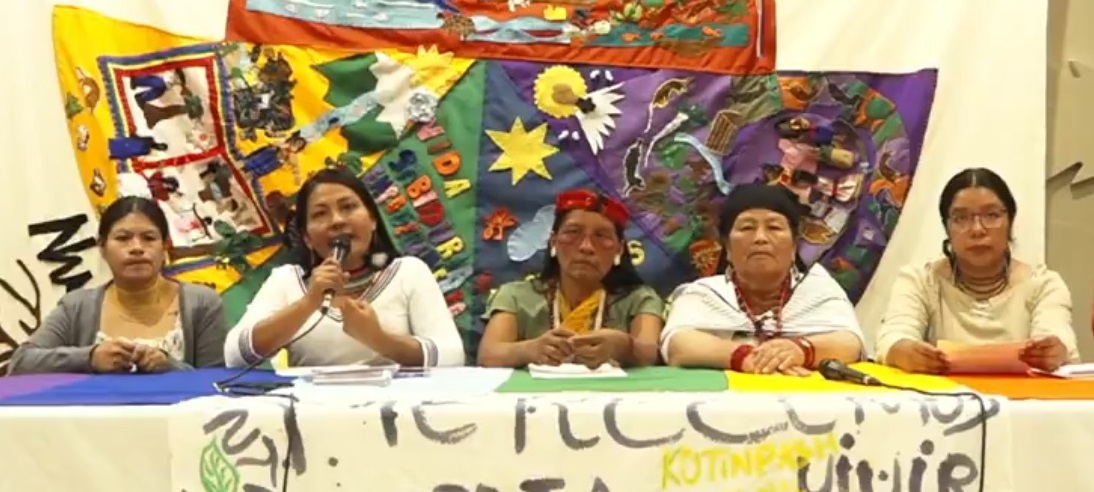Canada is rushing to finish negotiating a free trade agreement with Ecuador. An important goal is to promote more Canadian mining investment. On November 1st, Canada released a study called the ‘Initial Gender-Based Analysis Plus’.
Amnesty Canada is extremely concerned by serious gaps and omissions in this study, which fails to provide any information about gender-based impacts in Ecuador. The following response was sent to Canada’s Minister for Export Promotion, International Trade and Economic Development Mary Ng; Minister for Foreign Affairs Melanie Joly; and Minister for Women, Gender Equality and Youth Marci Ien, as well as to Canada’s Ambassador for Women, Peace and Security Jacqueline O’Neill.
Here is what we said …
Amnesty International Canada wishes to express concerns regarding the recently released Gender-Based Analysis Plus (GBA+) of the Canada-Ecuador Free Trade Negotiations. The GBA+ does not assess the gender-based impacts of more mining in Ecuador, despite well documented harms and violations linked to existing Canadian mining projects.
In October, prior to the release of the GBA+, Amnesty International Canada co-sponsored an awareness raising visit to Ottawa by a delegation of Indigenous women leaders and water defenders from Ecuador. The women met with the Parliamentary Secretary for Export Promotion, International Trade and Economic Development, Maninder Sidhu, to share their serious concerns regarding the human rights violations, increased social conflict, violence against women and girls, and environmental harms posed by Canadian resource extraction in their territories. They voiced their fears about the impacts of more mining, particularly in ecologically sensitive areas like high altitude wetlands – that provide drinking water to tens of thousands of people – and the Amazon region.
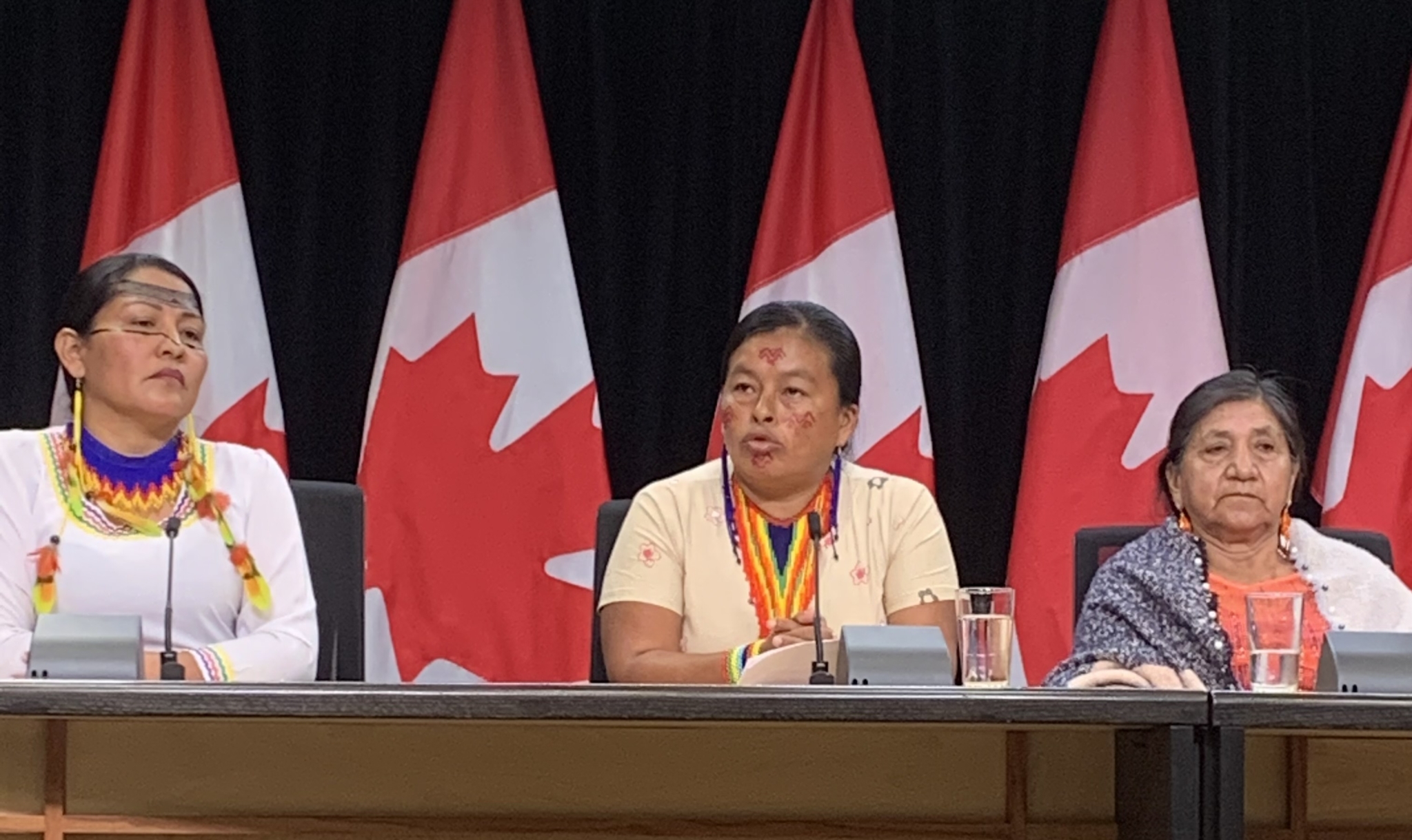
These concerns, which were also widely reported in mainstream media, must be included in Canada’s gender-based and environmental assessment. Human rights and gender-informed due diligence requires Canada to identify all potential impacts and make informed decisions to ensure that Canada’s trade policy does not undermine Canadian obligations under international human rights agreements. In its Report on Human Rights-Compatible International Investment Agreements, the Working Group on Human Rights and Transnational Corporations recommends that “States negotiate in future only such international investment agreements that are compatible with their international human rights obligations as well as national development needs and priorities.”
With this in mind, we draw your attention to a dangerous pattern of stigmatization and persecution of women and men who defend land, Indigenous territory and the environment, as documented in Amnesty’s September 2024 Submission to the UN Human Rights Committee. Since March 2024, over 70 women and men who have spoken out against the impacts of Atico Mining Corporation’s proposed mine in the province of Cotopaxi have been slapped with unfounded criminal charges of terrorism and organized crime. In addition to criminalization, Mining Watch Canada has documented how women defenders are facing acts of gender-based harassment and intimidation, including a wave of attacks on social media attempting to slander their reputation.
The situation is acute for Indigenous women and must not be ignored as Canada advances negotiations with Ecuador. “Indigenous girls, adolescents and women experience greater and more serious consequences of discrimination not only for being women but for being part of an Indigenous People or Nationality and because our ancestral territories and community lands are disputed by extractivism,” said Zenaida Yasacama, Vice President of the Confederation of Indigenous Nationalities of Ecuador (CONAIE) at a press conference on November 25, International Day for the Elimination of Violence against Women.
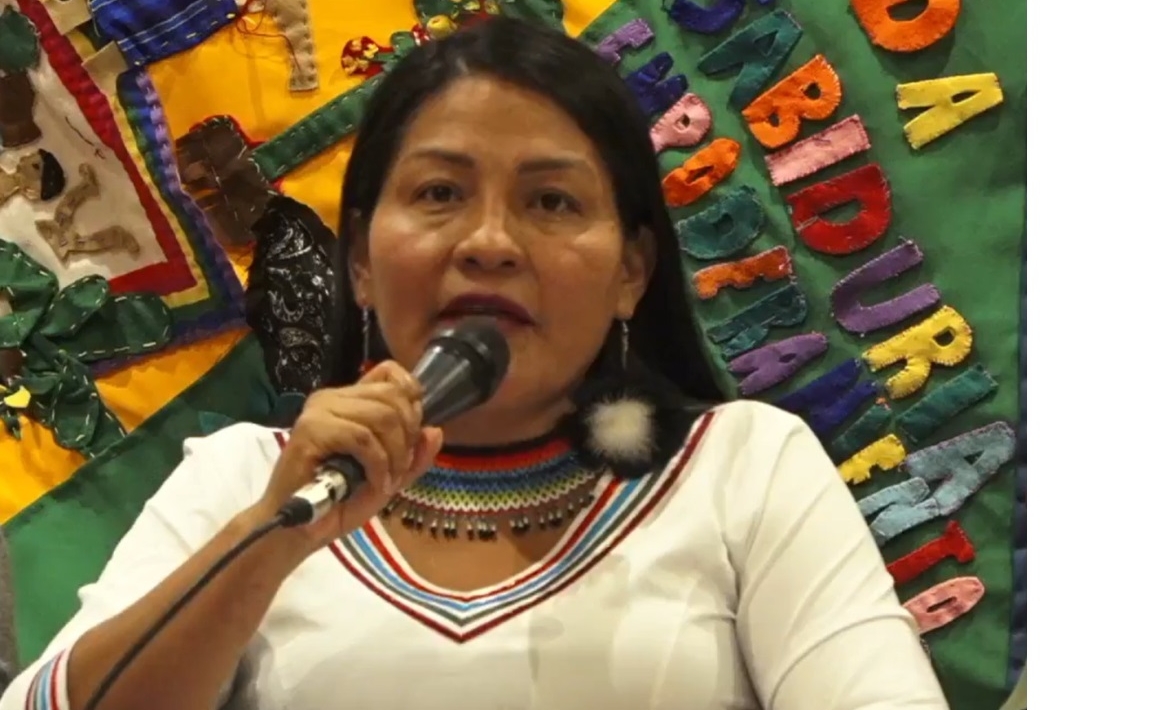
Ms. Yasacama added: “Political, gender-based and racist violence takes the shape of persecution of women who defend nature and Indigenous territory, as well as exploitation and sexual violence towards girls and young women in zones where there is extractivism.”
Political, gender-based and racist violence takes the shape of persecution of women who defend nature and Indigenous territory, as well as exploitation and sexual violence towards girls and young women in zones where there is extractivism.”
Zenaida Yasacama, Vice President of CONAIE
“We defend the territories of Indigenous Nationalities and Peoples because they are the source of life for people and the planet,” said Alicia Cahuiya, leader of Women and Family at CONAIE, at the organization’s press conference on November 25. “Indigenous territories are the source of our medicine, knowledge, spirituality and practices,” Ms Cahuiya explained. “That is why Indigenous women are defenders of our rights and our territories. Now we are seeing with concern that extractivism advances together with the persecution of defenders and that every day, adolescents and women face the risk of suffering sexual violence or exploitation in places where mining extractivism occurs. CONAIE is aware that the Amazon provinces are those that report the highest incidence of violence against women.”
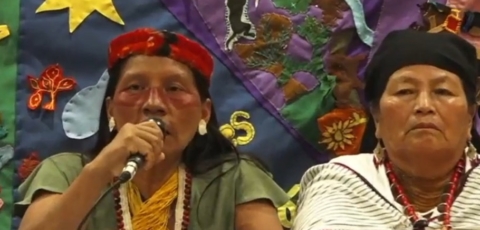
Now we are seeing with concern that extractivism advances together with the persecution of defenders and that every day, adolescents and women face the risk of suffering sexual violence or exploitation in places where mining extractivism occurs.
Alicia Cahuiya, leader of Women and Family at CONAIE
In a document sent to Global Affairs Canada and copied to Amnesty International, CONAIE concludes that Canada’s GBA+ of the free trade negotiations “lacks veracity” because it does not consider these impacts on women in Ecuador, adding that the largest Indigenous rights organization in Ecuador is “alarmed” by the implications.
Mujeres Amazónicas Defensoras de la Selva, a collective formed by women from nine Indigenous Nations and over 40 Indigenous communities in the Ecuadorian Amazon, is equally concerned about the GBA+, stating that “the analysis was conducted without listening to our voices and is disconnected from reality.”
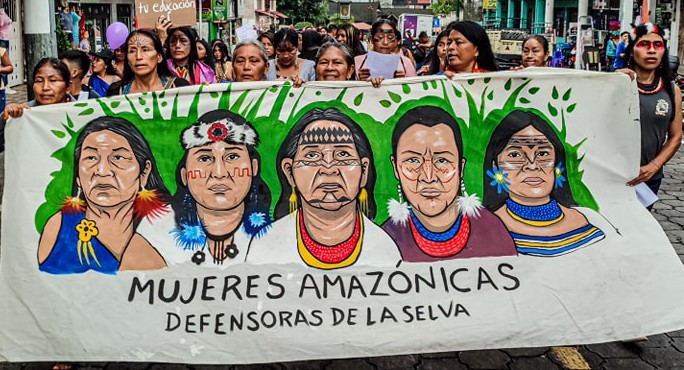
We understand that one of the objectives of this FTA is to promote Canadian mining and oil companies in Ecuador, but the Gender-Based Analysis Plus does not address any of the impacts of these industries on Indigenous women. As members of the Amazonian Women Defenders of the Rainforest collective, we know the reality of the impacts of extractive companies … because we have experienced it.
Mujeres Amazónicas Defensoras de la Selva
As an organization with a long, courageous history of defending Indigenous women’s rights, Indigenous territory and the environment, Mujeres Amazónicas Defensoras de la Selva, like the women leaders of CONAIE, are a credible, vital source of information and lived experience about the gender-based and environmental impacts that must be taken into consideration – and the necessary policy decisions that follow in order to prevent human rights violations. We urge you to pay careful attention to the following analysis they have shared:
“We understand that one of the objectives of this FTA is to promote Canadian mining and oil companies in Ecuador, but the Gender-Based Analysis Plus does not address any of the impacts of these industries on Indigenous women. As members of the Amazonian Women Defenders of the Rainforest collective, we know the reality of the impacts of extractive companies, both Canadian and non-Canadian, because we have experienced it.
There is information that is publicly available about the threats, intimidation, criminalization, violence, and murders that both Indigenous men and women have faced when defending our rights against extractive companies. In addition, there are other impacts that are not made visible, such as destruction of the social fabric, corruption, alcoholism, gender violence, and sexual violence, which leads to greater insecurity for Indigenous women and girls.
The current acceleration of industrial activities threatens to eradicate our cultures, languages, and ways of life. The link between extractivism and gender violence is clear, but largely ignored. Indigenous women, especially those who defend the Amazon, are disproportionately targeted, and our suffering often goes unnoticed by society and the judicial system. Our fight is for our territories and for our bodies because the land and the body are one.
This year, Ecuador, and the Amazon, have faced the worst drought on record, which is leading to the collapse of the Amazon, fires, power outages, and further devastation, both environmental, social, and cultural, which would be further aggravated by mining and oil expansion. We also face extreme flooding that increases the risk of collapse of mining dams. We cannot allow more mining and oil projects that devastate our lands, ecosystems, ways of life, and the physical and mental health of Indigenous women.”
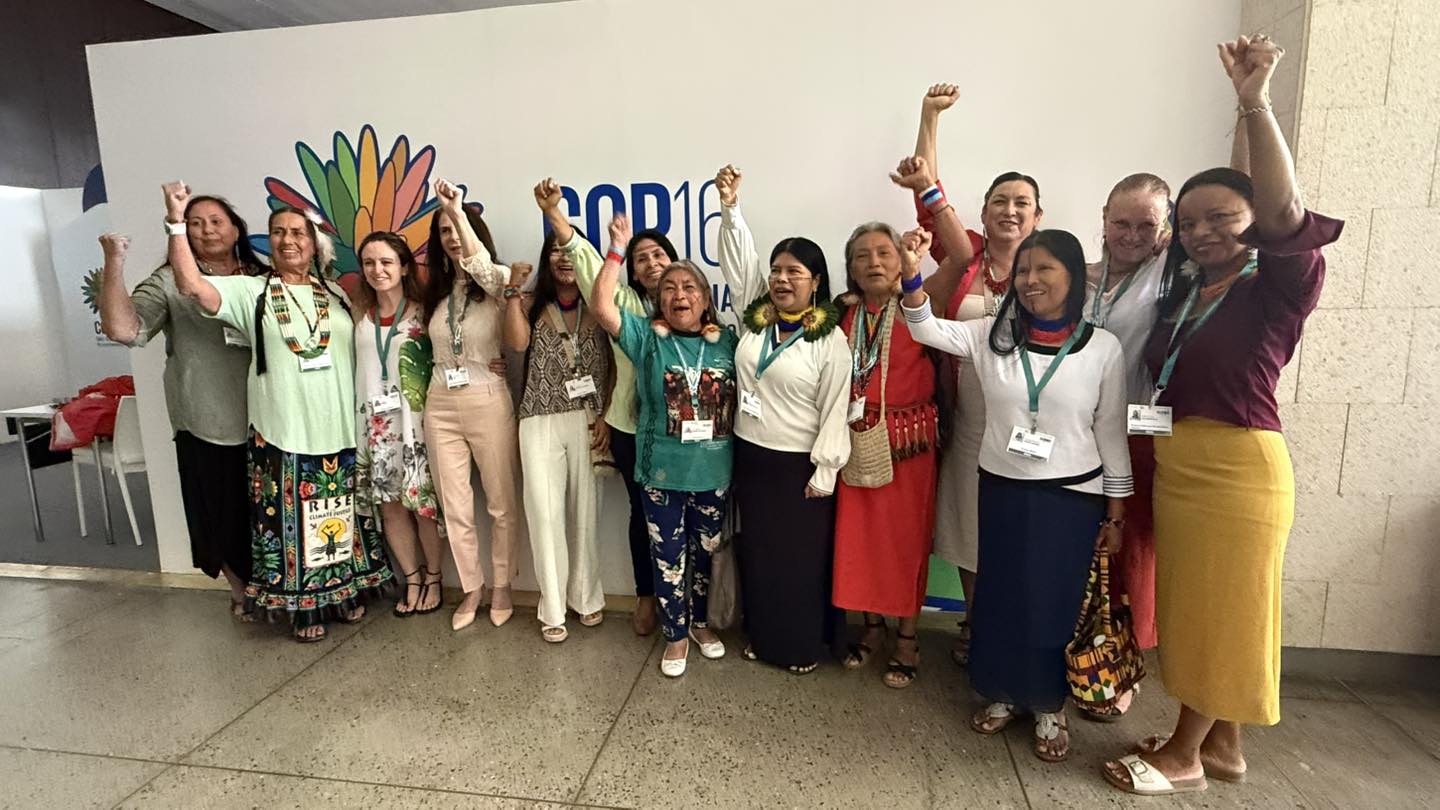
We urge Canada to:
- Fulfill its obligations to respect human rights standards, including the UN Guiding Principles on Business and Human Rights, the UN Declaration on the Rights of Indigenous Peoples, the Convention on the Elimination of all Forms of Discrimination Against Women, International Labour Organization conventions, and all international standards that protect the rights of rural communities, women and girls, and the right to a healthy environment. We urge coherence between these human rights obligations and Canada’s trade policy with Ecuador.
- Respect calls from affected Indigenous Peoples and communities in Ecuador for a stop to Canadian mining in the Amazon, the Andean Sierra, high altitude wetlands, and other ecologically sensitive sources of water, as per Canada’s commitments to prioritize climate protection and Indigenous rights.
- Comply with the recommendations of the UN Working Group on human rights and transnational corporations by ensuring that:
- Investor-State dispute settlement provisions are not included in any agreement with Ecuador, and
- Ex ante and ex post human rights impact assessments are conducted, in line with UN guidelines, paying particular attention to the impact on Indigenous peoples, racialized people, rural communities, workers, and women and girls in Ecuador. We emphasize that GBA+ analysis is no substitute for independent, impartial human rights impact assessment in line with UN guidelines.
- Ensure mandatory human rights and environment due diligence, through a legal framework enshrined in legislation – and access to remedy when rights are breached by Canadian companies operating in Ecuador.
Amnesty International reiterates our profound concern with the absence of human rights due diligence, transparency, information or consultation in Ecuador which has characterized the ongoing Canada-Ecuador free trade negotiations, amidst militarization of mining affected communities and human rights violations of devastating consequences for women and girls.
Statement by the Confederation of Indigenous Nationalities of Ecuador (CONAIE):
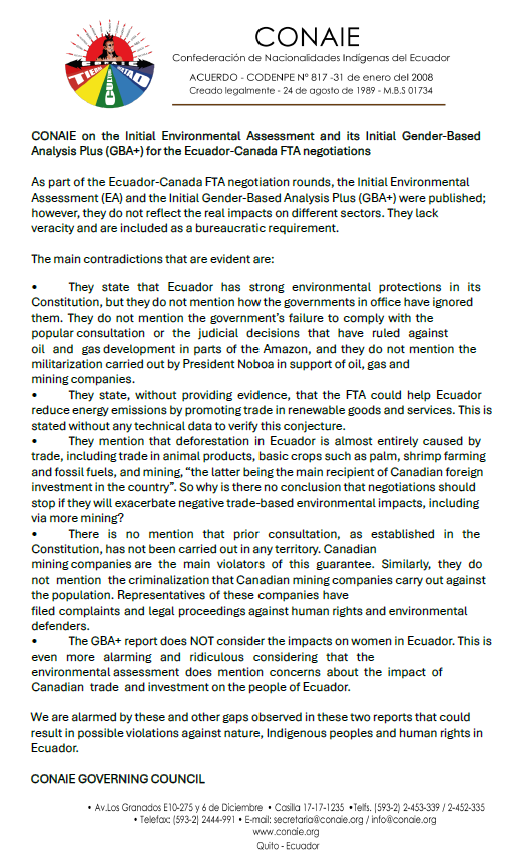
Statement by Mujeres Amazónicas Defensoras de la Selva (Amazonian Women Defenders of the Rainforest):














